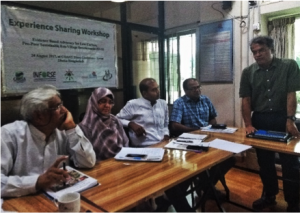Experience Sharing Workshop on Eco Village Development
Eco Village Development (EVD) is a CISU funded evidence based advocacy project in South Asia implemented simultaneously by partners in India, Bangladesh, Nepal and Sri Lanka. To further national advocacy for EVD approaches and technologies, Climate Action Network South Asia co-organised an experience sharing workshop with COAST Bangladesh in Dhaka. Civil society organisations were invited to the event along with government representatives from Ministry of Power and Energy, Sustainable Renewable Energy Development Authority (SREDA). National print media and representatives from community radio were also present.
The objectives of the workshop were:
- To discuss the current village development landscape with regard to energy access, sustainable livelihoods and RET (Renewable Energy Technology) at national and international level.
- To frame strategies to replicate the EVD concept at a larger scale in the country
A presentation on sustainable village solutions describing eco village technologies and approaches was made. The experience from advocacy at national, regional and international level were also shared with the audience. Feedback and comments were sought from the participants on the EVD approach and experiences.
Subsequent deliberations followed are mentioned in a nutshell.
- Clarity is needed pertaining to terminology of “Eco Village”. It is generic and could have very different meanings in different contexts. Despite the ambiguity of the term, the real objective behind building resilience through sustainable approaches should not be lost.
- “Pro-poor” tag of EVD approach need to be done away with as it hinders scaling up to people of higher economic segment.
- Cost effectiveness of sustainable technologies acts as a driver to scale up as demonstrated in the solar home systems.
- The elements vital for sustainable technology dissemination are:
- Benefits (multiple) generated
- Awareness level
- Distribution network
- Local institutions
- After sales service
- Identification of day to day challenges of women in using technologies should be identified and addressed. For instance, heat control method of Improved Cook Stoves is an issue which needs urgent attention from technology designers.
- Domestic energy use as a whole need to be addressed. For example, heating is inadequately addressed while lighting receives most of the attention from engineers and policy makers.
- Partnership is a key aspect to build on the success stories. Thus, the solution of scaling up lies on building partnership which need to be addressed.
- There are opportunities to mainstream EVD approaches in the ongoing government plans and schemes. Few opportunities include are Household Energy Platform, implementation of Bangladesh Action Plan for Clean Cooking, activities to improve energy efficiency and efforts to build market for renewable energy technologies.
Action Points
- Follow up with Joint Secretary, Ministry of Power and Energy to organise a workshop to mainstream EVD technologies and approaches in 1021 villages in Bangladesh.
- Follow up with Dr Atiq Rahman, CANSA Co-chair to organise a meeting with IDCOL, the National Implementing Entity of Green Climate Fund. The idea is to convert EVD approach and technologies into a bankable project for GCF funding.
Reported by: Santosh Patnaik
Location: Dhaka, Bangladesh





